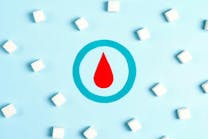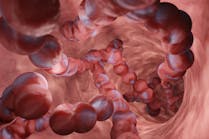Medical Laboratory of 2010
Each year, MLO sponsors a friendly competition among laboratories in conjunction with National Medical Laboratory Professionals Week (April 18-24, 2010). An MLO panel of judges selects the winner as well as the first and second runners-up. Our April issue presents these three winning laboratories to MLO readers via some of their professional accomplishments. This year's selections are committed not only to making their laboratories more efficient and customer-friendly but also to serving the communities in which they work. To each of these — and to all nominees — thank you for bringing high-quality testing and world-class performance to America's laboratories.
Winner
Leo's LEAN machine
LEAN/Six Sigma … and cooperation
The LEAN commitment and the exceptional performance of both support and testing staff has led to exceptional efficiency. The automated core section of the lab consists of seven instruments in an oval configuration, all handled by one laboratory professional. This individual works with a six-minute cycle time, and loads and unloads all core instruments and addresses any tests not autovalidated. The manual core has a float tech who is responsible for assisting the core tech with any instrument issues, covering for breaks, meals, and other absences. The manual core is staffed to provide coverage for microscopy, tests, sed rates, special coagulation, urine analysis, and other needs. In addition, all staff are cross-trained to maximize provision of the highest quality services at all times.
Serrano says, “We must operate unfailingly as a team if we are to comply with our mission to extend Avera McKennan's healthcare program innovation and development for our friends and neighbors whom we serve.” Inpatient phlebotomists work closely with nurses, who often accompany phlebotomists during their rounds to ensure continuity of care and who have trained the phlebotomists to answer call lights and to provide additional basic services if they are in the patient-care area. The laboratory and nursing staffs function as an integrated team in other aspects, not only in phlebotomy and specimen collection but also in point-of-care testing (POCT). The laboratory's POCT supervisor and coordinator are fully integrated into patient care, and ensure the quality and availability of appropriate POCT.
Other firsts for MLO's winner
Avera McKennan's laboratory has experienced many other “firsts” in the region, such as developing:
- the first hospital-based molecular-diagnostics department and full-service virology section;
- the region's only bone-marrow/peripheral-blood/cord-blood stem-cell processing laboratory; and
- the first same-day rapid-processing service in anatomic pathology in the region.
As the area's only hospital-based pheresis-donor program, the Avera McKennan blood bank provides not only conventional blood collection but also automated pheresis-component collection. The laboratory has added numerous new and esoteric procedures to meet the needs of its patients and physicians.
Because Avera McKennan is a regional transplant center, the Department of Pathology and Laboratory Medicine hosts numerous weekly and monthly conferences which are open to the medical staff, consisting of more than 400 providers including numerous specialists and sub-specialists, as well as to other interested healthcare providers. Together with its clinical colleagues, the lab provides extensive formal and informal consultations ranging from day-to-day operations to specialties such as perinatology; kidney, pancreas, and stem-cell transplants; advanced GI specialties; infectious disease; endocrinology; neurology; and nearly every specialty extant.
The lab — one of the most comprehensive in the area — serves as a referral lab for more than 400 clients throughout the region, with specialty services such as peripheral blood stem-cell processing; flow cytometry; molecular diagnostics; virology; full-service microbiology, chemistry and immunochemistry, and blood banking; extensive hematology and coagulation services, as well as immunology and protein laboratory, and complete anatomic/histologic pathology processing services.
Talking TATs
Turnaround times (TATs) are measured from collection to availability in the electronic medical record (vein-to-brain). Inpatient TATs at peak times (between 4 a.m. and 8 a.m.) have averaged <35 minutes for the last five years with a continuous downward trend. On-campus outpatient (OP) TATs have averaged 20 minutes for CBCs (collection to verification) and 33 minutes for chemistry panels. The emergency department TATs mirror the outpatient TATs, and troponin T levels are consistently available in 36 minutes. In addition to the exceptional TATs, testing error rates are at 5.4 sigma while test volumes have increased by more than 40% over the past five years.
A recent patient satisfaction survey of the Avera Cancer Institute OP center revealed a score of 4.8 out of a possible 5.0. The client services division of the laboratory — staffed by laboratory professionals — handles all inpatient and outpatient telephone calls, with 98% of the calls answered in less than one minute and a call-drop rate of less than 5%. Its goal is to resolve any issues in one call and to do so as quickly and thoroughly as possible.
Full of bright ideas
The lab participates in numerous community efforts both as a group and individually. The staff have numerous mechanisms for recognition of their peers for exceptional performance, public service, customer service, or any other venture that conforms with Avera McKennan's mission and vision. The use of “Bright Ideas,” a hospital-wide electronic program, allows any employee to make suggestions for improvement; suggestions are analyzed and employees are updated on the status of their tips. “Bright Ideas” has made creativity a standard part of the organization's workday. Innovations such as the laboratory's updated automated and manual core concepts, extensive cross-training, unique microbiology workflow, and other such innovations, along with the fact that the lab does not use front-end automation of track systems, is further evidence of the creativity of both staff and leadership.
Within the past year, the College of American Pathologists (CAP) awarded Avera McKennan Laboratory accreditation to the CAP ISO 15189 Accreditation Program, the second laboratory — and the first hospital laboratory — in the United States to reach this achievement. The accreditation is based on the International Organization for Standardization's (ISO) requirements for technical competence particular to medical laboratories and continual quality management, and focuses on improved patient safety and risk reduction. ISO 15189 does not replace the Clinical Laboratory Improvement Amendments (CLIA)-based Laboratory Accreditation Program but complements CAP accreditation and other quality systems. Recently, the lab successfully underwent its second annual CAP ISO 15189 inspection. The laboratory is additionally accredited by AABB and the Foundation for the Accreditation of Cellular Therapy (FACT), and is licensed by the Food and Drug Administration. It was also the recipient of the Avera Health System Quality Award for Exceptional Clinical Quality at this year's Avera Quality Awards.
All of this (and a lot more) explains why Avera McKennan is winner of MLO's Medical Laboratory of the Year 2010.
First Runner-Up
Ali's awe-inspiring African lab
Since its inception almost 20 years ago, MU-JHU Core Lab has gained a reputation for uncompromising standards of quality, excellent laboratory service, and a desire for building laboratory capacity in Uganda. Presently, no laboratory licensing or accreditation is available or required in Uganda; nevertheless, the MU-JHU Core Lab has been accredited by CAP since April 2003 — the second-ever CAP-accredited lab on the African continent (currently, there are about six). For a lab in a developing country struggling with provisions for essential services, this is a remarkable achievement. Because of the lab's outstanding 2009 CAP inspection outcomes, a national Ugandan newspaper, The Monitor, published an article on July 16, 2009, about the laboratory.
The MU-JHU Core Lab went though the June 2009 CAP inspection in with a perfect score — zero deficiencies; its score in 2007 was also a zero citation. Its June 2009 CAP Inspection Team Leader was Peter J. Howanitz, MD, from the New York Medical Center University Hospital. During the inspection's summation meetings, he commented, “During my 30-year career as a pathologist and CAP inspector, I have never inspected any lab and not found any citation, including my own lab. So, this is a first for me.”
But, with its leadership's quest to attain the highest world-class laboratory quality standards available, MU-JHU Core Lab somehow manages to adhere to CLIA regulations, internationally recognized Research Ethics, Good Clinical Practices (GCP), and Good Clinical Laboratory Practices (GCLP) guidelines. The MU-JHU Core lab currently utilizes CAP's External Quality Assessment (CAPEQA) program for the majority of the tests offered in the lab as well as participating in the Virology Quality Assurance (VQA) and U.K. National External Quality Assurance Schemes (UKNEQAS) programs to satisfy some researchers' and sponsors' regulatory requirements.
Challenges: part of a daily routine
The MU-JHU Core Lab offers both clinical and research laboratory services to individuals and to more than 59 different clinical research studies, public and private hospitals, and clinics. Its staff performs many tests in the areas of chemistry, hematology, serology, urinalysis, flow cytometry, parasitology, molecular pathology, and pharmacology (currently being set-up). The MU-JHU Core Laboratory services are in high demand; it is one of busiest medical labs in Uganda, processing an average of 16,000 tests monthly. Although 16,000 might not be sizeable compared to U.S. labs, the testing volume is fairly high for local laboratory standards. Efficient processes and well-trained, competent lab professionals enable the lab to cope with the high testing demand and yet maintain outstanding TATs. MU-JHU clients are immediately notified if downtime causes delays in resulting of routine reports. In May 2009, the Core Lab reduced the expected TAT for 95% of routine samples by 50% from 72 hours to 36 hours.
The Core Lab makes imaginative use of its meager resources in order to meet ever-increasing client demands for quality lab services and to continue offering affordable quality testing. The Core Lab collaborates with a number of organizations, laboratories, vendors, and stakeholders in the Ugandan Health Service to fulfill its needs for equipment maintenance, reagent supplies, operational polices, and back-up services in the event of lab-operation interruptions. But challenges like increasing prices for fuel and lab supplies (e.g., taxes, shipping and handling costs), as well as staff development needs.
Since the MU-JHU Core Lab did not have financial resources in 1999 with which to purchase a reputable comprehensive laboratory information system (LIS), it procured a “homemade” LIS (developed by a Chinese/U.S. software company) to which the lab has just kept adding enhancements to improve productivity. Throughout the years, the Core Lab has created efficient LIS downtime procedures — downtime often occurs due to lack of local software support and a fluctuating electricity supply. In Uganda, the lack of local preventive maintenance and/or repairs for the lab-automated analyzers means waiting up to three to four weeks to get a technical rep. So, to guarantee continuous service, the lab has two of each analyzers/instrument in case of failure of any instrument.
The impact of HIV/AIDS
Ever since the government of Uganda recognized the threat of the HIV/ AIDS pandemic and spearheaded efforts toward prevention, prevalence rates have gone down from over 20% to about 6%. Several prevention and treatment efforts, as well as research into vaccine options for HIV/AIDS, were conducted by many American universities in collaboration with Makerere University (such as MU-JHU Research Collaboration) the Ugandan government, and the private sector. Talking about health in Uganda or even in Africa means the mention of the HIV/ AIDS pandemic. Indeed, the MU-JHU Core Lab's most important contribution to patient care has been its participation in the landmark 012 clinical trial, which resulted in a more than 50% reduction in the mother-to-child HIV transmission with a single-dose of Nevirapine.
Nationally, in Uganda, MU-JHU Core Lab validated the current HIV rapid testing algorithm used by all government lab facilities. Indirectly, the lab also contributes to quality patient care by being a training site as a center of excellence in laboratory medicine for clinical and laboratory personnel in the monitoring of patients on HIV treatment. In Uganda, everyone is affected by the HIV pandemic; in only the past four years, the “Core Lab family” (the way many clients refer to the lab) lost two lab-technologist colleagues to AIDS. The Core Lab team is passionate about transforming AIDS patients' lives by participating in HIV treatment and vaccine trials.
In an effort to find a reliable and cheaper CD4 testing methods for resource-limited settings (e.g., Sub-Saharan Africa), the lab hosted a research study testing CD4 count utilizing three different methods to establish the level of accuracy, reliability, and value. There are many physiologic variations in normal laboratory values among different race/ethnic groups; and because there were no established pediatric reference ranges in Uganda, the Core Lab conducted a study for Ugandan pediatrics (0-6 months of age) normal ranges to help establish local reference ranges in October 2007.
Professional development on-the-job
Not only is quality work the result of dedicated effort by staff and lab management, it is also the result of this lab's personnel being willing to ask clients (i.e., patients) for feedback on all aspects of its service and asking how to improve that service. The MU-JHU Core Lab has created and maintained a number of initiatives for several years to ensure customers receive highest quality services.
At MU-JHU Core lab, the staff is required to complete annual continuing education (CE) to provide personnel an opportunity to review and expand their knowledge of laboratory procedures and policies, and any other subjects pertinent to successful laboratory operations. New employees are checked for competency twice during their first year of employment. Existing employees are checked annually and periodically as needed. Staff competency is assessed through monitoring and evaluation using test-specific proficiency specimens along with a annual competency evaluations.
Lab team members also are held accountable to job-description agreed-upon quality standards of work. This is achieved with the aid of a process-improvement form which is utilized by all staff to issue to fellow staff members a corrective action plan in the event of a deficiency, discrepancy, or problem — or to record praise for achievements. These records help the lab quality-assurance team keep track of incidents likely to affect quality standards, as well as recognize special efforts and innovation by lab staff toward achievement and maintenance of standards.
A winning team
Last year, the Core Lab celebrated the 20-year anniversary of John Abima, senior lab technologist, 2nd shift. Teamwork is a main reason the Core Lab is successful. Teamwork is a basic value of the MU-JHU Lab, which operates to ensure adequate coverage for at least 14 hours during working days, including Saturdays, Sundays, and holidays.
The Core Lab team members come from many diverse ethnicities; personal and professional attributes are appreciated among the group, which considers its family atmosphere helps the staff maintain a work-life balance. The lab's social welfare committee enhances this family-type relationship, an essential element of the social make-up in the many African cultures.
MLO welcomes back Ali's team!
Second Runner-up
Becerra and the team crunch the numbers
- Air and Education Training Command Medical Service Lab Category II Team of the Year Award (entire laboratory);
- Air and Education Training Command Lab Manager of the Year (Capt. Becerra);
- Company Grade officer of the 2nd quarter (Capt. Becerra);
- Featured in ADVANCE magazine (Capt. Becerra);
- Senior Enlisted of the Quarter for 3rd quarter (Master Sgt. Lewis);
- Non-Commissioned Officer of the Quarter for the 4th quarter (Staff Sgt. Hodge);
- Civilian Category II of the Quarter for the 4th quarter (Mr. Coffman); and
- Civilian Category I of the Quarter for the 4th quarter (Ms. Medina).
Many of these same lab employees volunteered for 11 non-profit organizations to fulfill community needs, donating 432 hours total and saving those organizations $24,700 in labor costs. Still others among the team volunteered as phlebotomists at various times throughout the year. By the way, the team's phlebotomy skills have been recognized on 30 patient clinic critiques and quarterly clinic customer service-delivery assessments. For the Department of Defense bone-marrow drive, the team registered 155 airmen, aiding the world's largest registry program.
Money makes the lab go around
Among its achievements, the group coordinated four base-wide blood drives; registered 4,026 donors; collected 3,905 units; saved the U.S. Air Force $1.9 million in blood costs; and rendered support to Operation Enduring Freedom/Operation Iraqi Freedom blood needs. When the team launched its new Coumadin Clinic, not only did providers have immediate results but also 125 patients received streamlined treatment; this concept saves the lab $5,000 annually. When the 82nd Medical Support Squadron's Clinical Path folks conducted an STD study, they ran 60 samples and brought the test in-house two weeks ahead of schedule, cut patient result time by 24 hours, recouped 220,000 lab tests annually, and saved the Air Force $11,000 in referral costs.
Then they collected 250 third-party billing forms from patients and recaptured $12,000 for the laboratory (and for this, they received “Top Ancillary Award” from the Medical Group). At no cost, the group procured an ultra-low freezer from the Department of Defense Re-utilization Service to meet strict H1N1 requirements, thus avoiding the rejection of 100 specimens and its possible impact to patients and the mission, while saving the Air Force $5,000 in procurement costs. In their end-of-year audit, they identified a fund surplus of $51,000, a revenue return which enabled an MRI analyzer acquisition. A final tally showed the lab performed 150,000 tests last year, executed $2,000 in resources, a $550,000 budget, and eight contracts worth $600,000 with zero shortfalls.
Every minute counts
Team members of the Clinical Pathology Services lab slashed patient wait time to five minutes, crushing the Air Force standard by 33%. The group organized equipment repair for four analyzers, which avoided 40 hours of downtime — no patients' tests were delayed. During their lab renovation project, they relocated $400,000 in major equipment items and supplies to an interim lab, resulting in a flawless one- versus two-day execution — with zero disruptions to patient care and zero specimen rejections. This team standardized PKU testing, cutting turnaround times by seven days; the lab's “zero errors” for 300 patients per year resulted in the honor of being the No. 1 Lab out of 1,630 labs in the great state of Texas. When they installed and validated their in-house urine creatinine analyzer, diagnosis was enabled in less than two hours versus seven days, accelerating the standard of care. Finally, they reviewed 50 charts for the point-of-care program and trained 15 personnel; this cut reporting time down by 90% and saved $5,000 in supplies as well as 180 staff-hours annually.
Tallying up business, education, personnel, and more
The 82nd Medical Support Squadron's Clinical Pathology Services group propelled its lab into the 21st century by finalizing its $520,000 renovation project, which was coordinated among vendors, facility management, and 26 contract personnel. They revamped lab material-safety data books, updated 89 hazardous chemical lists and 650 MSDS pages until these were fully compliant. They scoured 1,000 work documents, accounted for 100% of all tests, and optimized the workflow — the result was that, now, workflow is six-plus hours faster, and the standard of care boosted by 80%. Their solid quality-assurance program found the team tracking all statistics, creating new quality-control forms and training processes, and fixing 35 items which resulted in cutting errors by 98%. By monthly tracking of all statistics on supplies and equipment, and referral and in-house testing, the group compiled a report for the Air Force Institute of Pathology in Washington, DC, which aids the Air Force Surgeon General in making decisions regarding the Air Force Medical Service as a whole.
As the salmonella-outbreak team, the lab professionals analyzed 30 cases and identified the contamination source, thus protecting some 25,000 personnel. They played a vital role in the influenza A/H1N1 flu outbreak; briefed public health on laboratory operations for the outbreak, prepped military and civilian reference labs for increases in testing, and managed to produce 462 results in 72 hours. Their seamless support of the base's Drug Demand Reduction Program saw the team collect 450 legal-drug urine samples with iron-clad chains-of-custody and zero sample rejections. In addition to all of this, the group identified base-wide fire-evacuation policy oversights including special-needs patients' requirements, which were added to local policy; stair chairs were purchased to aid patients during fire emergencies, so the facility is now 100% compliant with CAP and Federal regulations.
This team of laboratory professionals also maintained a solid proficiency program, performing 434 CAP surveys with 12,000 analytes with a 99% average, exceeding the Air Force standard of 80%. The lab received zero deficiencies on its Environmental, Safety and Occupational Health Compliance Assessment and Management Program inspections, zero deficiencies on the AAAHC self-inspection, and only one deficiency on its CAP inspection.
MLO salutes the Air Force's 82nd Medical Support Squadron's Clinical Pathology Services team.
Panel of Judges
Our esteemed MLO Editorial Advisory Board Members who served as judges for the Medical Laboratory of the Year 2010 Award are:
C. Anne Pontius, MBA, CMPE, MT(ASCP), is a senior medical practice consultant with State Volunteer Mutual Insurance Co. in Brentwood, TN.
Brad S. Karon, MD, PhD, is assistant professor of laboratory medicine and pathology, and director of the Hospital Clinical Laboratories, point-of-care testing, and phlebotomy services at Mayo Clinic in Rochester, MN.





